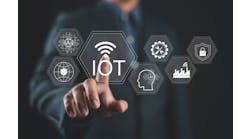Rockwell Automation knows process. Bottom line. End of story. Keep reading if you want to. The rest of this text is optional.
Still, if anyone has any tiny, lingering doubts that Rockwell Automation isn't a major player in process automation and control, they can be dispelled by just talking to the presenters and more than 300 customers and many others attending its Process Solutions User Group (PSUG) 2010. Organizers report the Nov. 1-2 gathering was the largest and most successful PSUG ever. It was held just before the opening of Rockwell's Automation Fair 2010 this week at the Orange County Convention Center in Orlando, Florida.
Leading these many and varied customers is PSUG's 10-member Customer Advisory Board (CAB), which includes representatives from Archer Daniels Midland, DuPont, Eli Lilly & Co., Gerrie Process Group, Industrial Furnace Co., JNE Automation, Kraft Foods North America, Pacific Gas and Electric's Diablo Canyon Power Plant, Pfizer, and Procter & Gamble. "We share best practices with each other and with Rockwell Automation, and this drives production and solutions development, as well as the content of out PSUG meeting," said Bob Pegher, electrical and process controls engineer at Kraft Foods, speaking for PSUG's CAB.
"The impact of sustainable activities ripples through the whole corporation." Rockwell's John Nesi explained how the company can help process manufacturers respond to sustainability, as well as globalization, productivity and innovation needs.
"We listen to these and all of our customers, and so we've expanded our plant-wide optimization efforts and PlantPAx architecture into high-availability, and we've integrated software and safety as a result of our recent acquisitions of Pavilion and ICS Triplex," said Ken Deken, Rockwell Automation's vice president of portfolio management, during his introduction of PSUG's three keynote speakers. "We think this is the biggest and best PSUG ever, and it really reflects our opportunity to serve all of you better through plant-wide control and optimization. Rockwell Automation has become a full-service distributed control system (DCS) supplier, and there is no company that has more of an ear to the ground in this area for you now and in the future."PSUG's first keynote speaker, John Nesi, Rockwell Automation's vice president of market development, led off by reporting that the firm's fiscal 2009 sales were $4.9 billion, and that 2010 will likely be even closer to $5 billion when its latest earnings are released next week. Rockwell Automation's two main operating segments are Architecture and Software, and Control Products and Solutions. Also, although 50% of Rockwell's revenues came from North America in 2008, the company projects that 60% will come from Asia-Pacific, Latin America, Europe, the Middle East and Africa in future years, Nesi said.
"Manufacturing has come back strong from the recession, and we're getting back to 2008 levels, but global growth rates are probably going to flatten out to 2-3%," Nesi said. "The established economies will continue to limp along as well, but we also see more stable growth in the future. As a result, Rockwell Automation is continuing its investments in process, software, OEMs, safety and emerging markets."
Consequently, Nesi explained, the four primary manufacturing challenges that Rockwell Automation sees now are globalization, sustainability, productivity and innovation. "Investors used to be able to diversify counter-culturally, but since 2000 we've been seeing the slow synchronization of economies across the world, and this has affected credit and capital markets. Now, the global synchronization of supply chains has begun too, so speed and innovation are more critical then ever, and optimization within plants will be consistent with their overall enterprise competitiveness."
Likewise, on the sustainability front, Nesi reported that optimization of resources also is consistent with goals of overall enterprise efficiency and productivity. "Energy utilization has become top of mind, and environmental concerns are mounting. There's a lot of ‘petro-paranoia' because we have to buy from people who often don't like us and drill in more dangerous areas," said Nesi, who added there's also growing concern about water scarcity problems, cap-and-trade reporting issues, alternative energy markets, smart grid development, smart factories, power cogeneration and biomass recovery, and how to produce more sustainable products and processes.
"The impact of sustainable activities ripples through the whole corporation, and sustainability can become a key enabler for corporate success," he said. "We should all be looking at green initiatives as the next lean initiative. Sustainability is simply a new way to do things, and our version is called Sustainable Production."
Rockwell Automation divides its Sustainable Production program into three main areas—energy, environment and safety—to better assist its customers. For example, it's now launching a new Industrial GreenPrint consulting service to help users monitor and become aware of their actual energy use, efficiently manage and optimize that use, and then aggregate it to improve their enterprise's overall energy supply chain.
Finally, to help innovation flourish despite aging facilities and engineering staffs, future plant operations will need smarter control systems, more predictive modeling up front, and improved simulations, Nesi explained. "Many operators and managers know their asset utilization could be better, but they don't know how to get there, and good decision support can help," he said. "Our solution is plant-wide optimization, which maximizes return on assets, enables flexible operations, and aids innovative engineering. A plant is just part of an optimized supply chain that happens to be located within four walls."
Rockwell Automation accomplishes its plant-wide optimization by using new technologies and its longstanding Integrated Architecture strategy to "converge" the plant, open new levels of visibility, enable flexible and fast responses to market demands, and further simplify basic functions and systems, Nesi said. "Users get more and better information if they can combine their automation and information systems, but it's been hard and costly to get these disparate plant and business systems to work together," he added. "We've been doing this for more than 10 years with our Integrated Architecture and Logix solutions, but now we're getting even deeper into process, safety and other information layers. This includes making our PlantPAx process automation architecture part of one cohesive system, and moving formerly offline modeling onto the rack to aid core platforms. This allows us to extend users' investment and get answers that ERP systems just can't provide."
PSUG's second keynote speaker, Larry O'Brien, process automation research director at ARC Advisory Group, confirmed that Rockwell Automation is one of the top DCS suppliers, but added that all the process industries continue to face challenges from labor shortages, safety, plant optimization, installed base, operations and commercial off-the-shelf issues. "We're now losing thousands of years of individual experience and knowledge, and once those employees and their brains walk out the door, it's not likely to come back," O'Brien said. "The new process automation end user is getting younger, though their average age is still in the 50s; they have more academic credentials; and they're more comfortable with social media, Internet, mobile computing, gaming, texting and wireless."
Beyond the experience exodus, O'Brien added, there's a disturbing increase in the frequency and severity of safety incidents, even though all of them were the result of preventable causes. Likewise, he added that many managers also aren't taking advantage of plant-wide optimization opportunities or integrating across their supply chains. "However, plant-wide control can reduce project costs, and then also contribute to bottom-line energy savings."
To give plants and their emerging knowledge workers the tools and information they need, PSUG's third keynote speaker, Som Chakraborti, director of Rockwell Automation's process automation business, reported that the company is adding to PlantPAx system's capabilities with this week's announcement and next quarter's launch of PlantPAx System Release 2.0, and also expanding its channel programs for its process customers with 50 new global solution integrator partners.
"In the past year, we've had PlantPAx successes in a range of applications, including consumer products, life sciences, pulp and paper, cement, minerals and mining, metals, oil and gas, water utilities and power," Chakraborti said. "This has been a very strong trend of adoptions. We began building PlantPAx system's to have a DCS-like appeal, then integrated acquisitions and partnerships to its core, and so now we have a unified PlantPAx DCS and process portfolio. The next phase is expanding PlantPAx for larger projects with high capital expenditures that need high availability, but then also focus on smaller processes capabilities for OEMs."
PlantPAx system's new high-availability functions will include HMI data and alarming capabilities, control via Logix L73 and L75 controllers, communications with EtherNet/IP, and 1715 Series I/O based on ICS Triplex technology.
Chakraborti added that Rockwell Automation also will introduce its AADvance "brains in a box" for SIL2 safety applications, and a new high-density HART I/O module.

Leaders relevant to this article:





